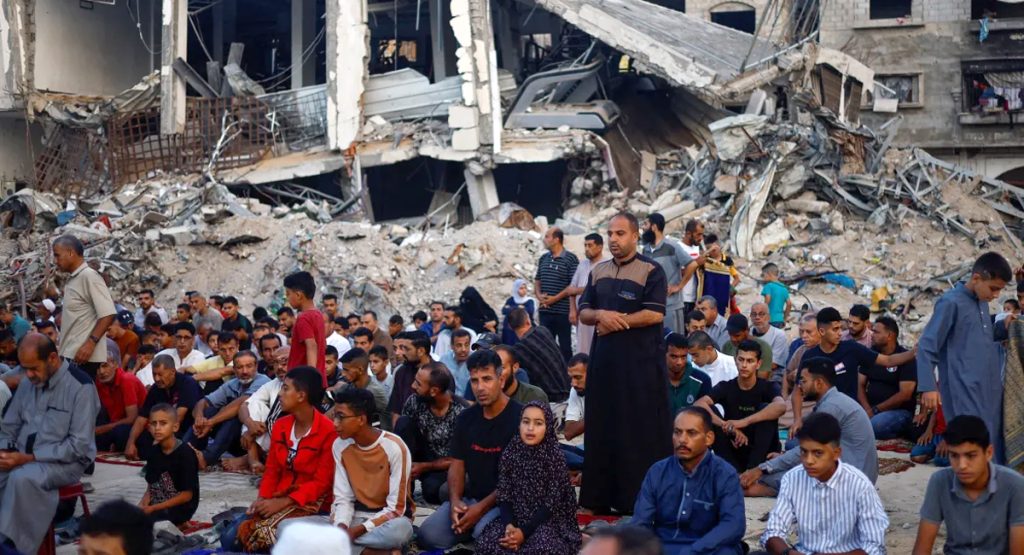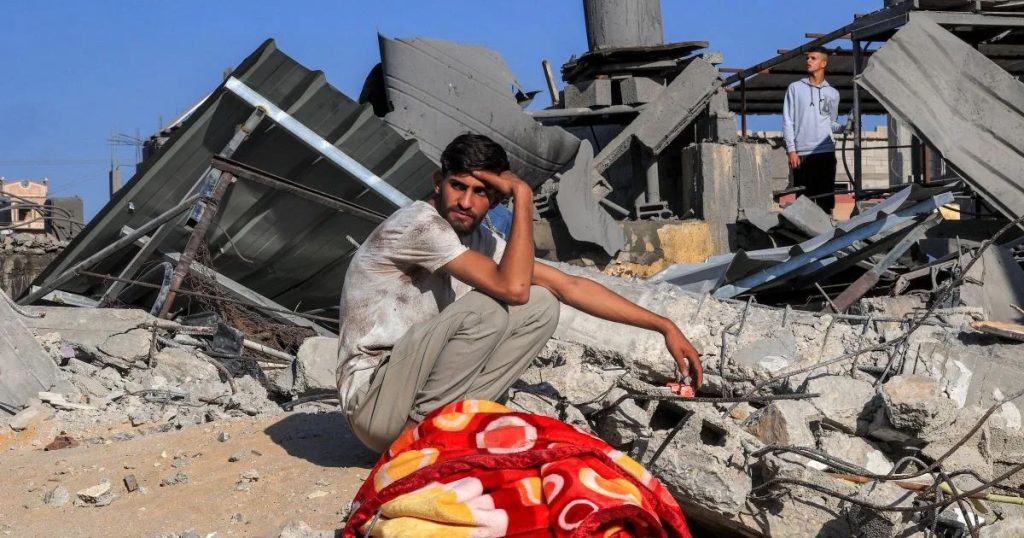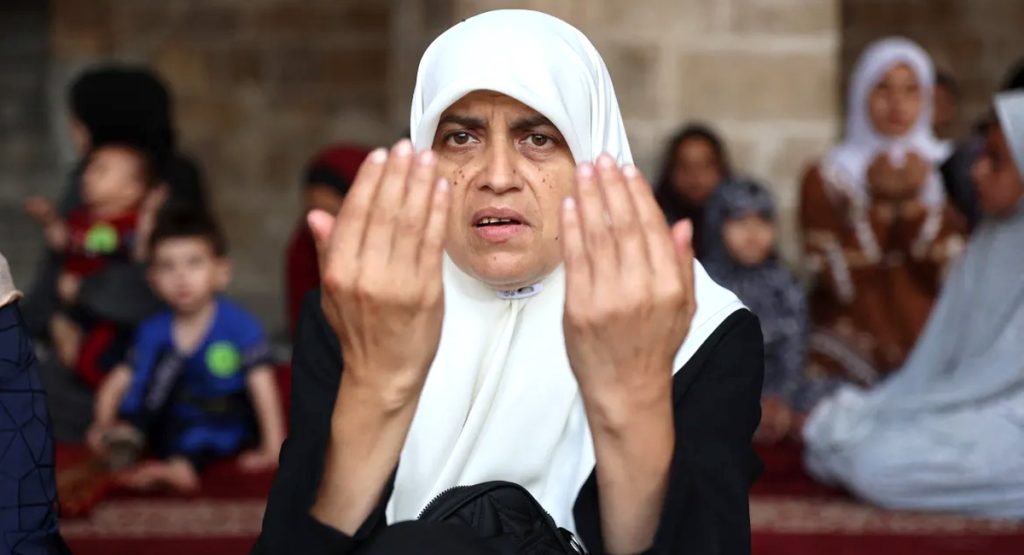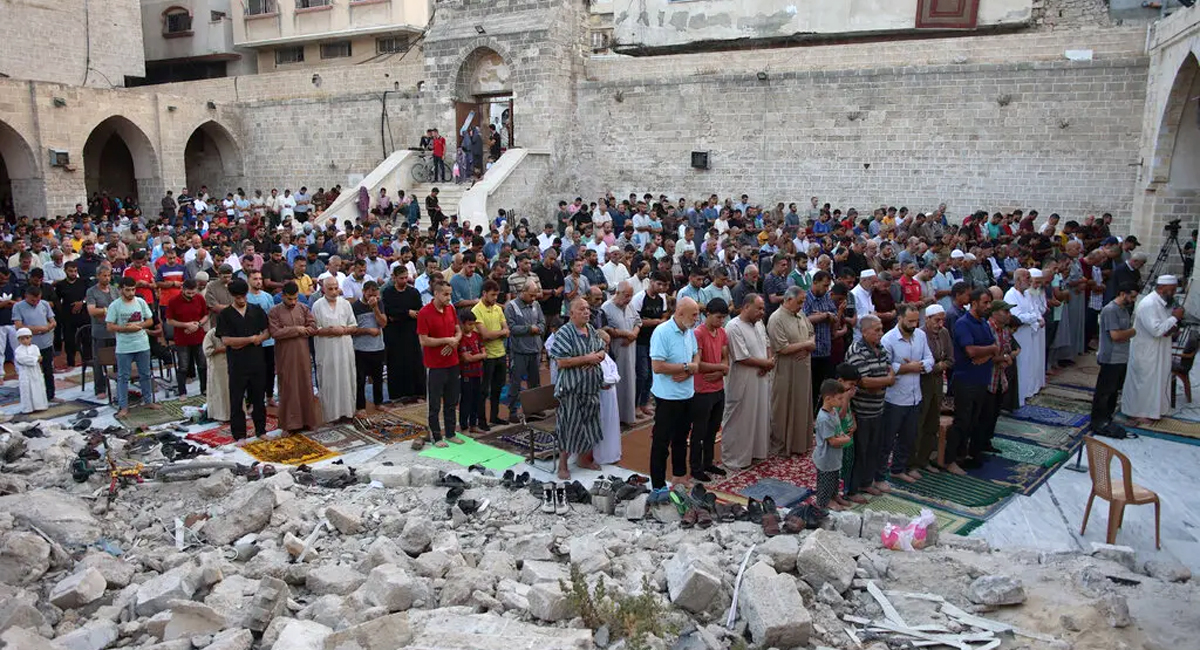Following eight crushing a very long time of war, Muslims in Gaza on Sunday denoted a dismal Eid al-Adha, a significant strict occasion typically celebrated by dividing meat between companions, family and the destitute.
Palestinians in the Gaza Strip were not able to celebrate Eid al-Adha the way they had in previous years.
In the southern city of Khan Younis, dozens gathered on Sunday morning near a destroyed mosque to perform Eid prayers. They were surrounded by debris and the rubble of collapsed houses. In the town of Deir el-Balah in central Gaza, Muslims held their prayers in a school-turned-shelter. Some, including women and children, went to cemeteries to visit the graves of loved ones.
After prayers in the rubble of mosques, Rafah’s 1m displaced Palestinians found little to be festive about amid grief, hunger and danger.
Prayers were held in mosques badly damaged in the continuing Israeli offensive, in the crowded schools where many have lived since being forced to flee ruined homes elsewhere in the territory, and on the sand among the rows of tents now home to hundreds of thousands.

“Today, after the ninth month, more than 40,000 martyrs, more than 90,000 wounded, and hundreds of thousands of homes were destroyed,” a displaced Palestinian said “Our people live in difficult circumstances.”
Hunger has a grasped the Palestinian area as Israel has released an eight-month military hostile on the territory and seriously limited what is permitted to enter, including compassionate guide.
Many don’t want to celebrate.
“There will not be any Eid, nor any Eid climate,” said Zaina Kamuni, who was living with her family in a tent on a sandy span of land in southern Gaza called Al-Mawasi. “I haven’t eaten any meat in five months.”
“It doesn’t feel like Eid because of the lack of a beautiful atmosphere, and we are not buying clothes and sweets, or gathering together like we usually do,” said a 12-year-old dispatched by her displaced family to sell homemade goods to neighbours in Rafah to raise much-needed funds.
“It will be a day like some other day, very much like Eid ,” she added, alluding to the next significant Muslim occasion, which Gazans noticed over two months prior under similar circumstances.
Since the conflict started on Oct. 7 after the Hamas-drove assault on Israel that Israel gauges killed 1,200 individuals, Gazans have gotten through extreme normal bombardments and hardship. In excess of 37,000 individuals have been killed, as per Gazan wellbeing specialists, and appetite is widespread.

“With proceeded with limitations to helpful access, individuals in #Gaza keep on confronting frantic degrees of yearning,” UNRWA, the Assembled Countries organization for Palestinian displaced people, posted via web-based entertainment on Saturday, adding that in excess of 50,000 youngsters require treatment for intense unhealthiness.
“When the prayers began, I started crying because it was my first Eid without my husband and so many of my family. When my children woke up, they began to look at pictures of their father and wish him a happy Eid. This is not Eid and cannot be Eid,” said a widow.
“Everyone in Rafah is living in absolute desperation and fear of what is about to happen. There are thousands and thousands of people, so close together. There are no water supplies, lakes of raw sewage everywhere … and children sitting by the roadside with pans begging for food,” she added.
People did not sleep at all last night thinking about what they will do, who will keep them company during day, who will pray the Eid prayer with them, with whom they will eat today, and with whom how they will visit their relatives. The joy of Eid disappeared with the loss of their families.”
The Israeli military reported an everyday respite in military tasks close to a southern Gaza line crossing to permit more guide to enter the region, despite the fact that it was not quickly certain if a lot more supplies would get in. The U.N. World Food Program cautioned this previous week that southern Gaza could before long see the devastating degrees of craving recently experienced by Gazans in the north of the region.
The Government Media Office in Gaza said on Saturday that Israel was barring the entry of sacrificial animals into the enclave, thus preventing Palestinians from performing sacrificial rituals as part of Eid al-Adha.
Meanwhile, at Al-Aqsa Mosque in occupied Jerusalem, 40,000 Muslims performed Eid al-Adha prayers, much less than the estimated 100,000 who attended in 2023. On Sunday, Israeli forces also assaulted worshippers entering the mosque and blocked others from reaching the holy site
Numerous Gazans have stuck to trust in the midst of reports of discussions and proposed truce bargains among Israel and Hamas. Yet, the death of each occasion — including Christmas and Easter for Gaza’s little Christian populace — is an indication of how dug in this war has become.
A Palestinian man gauging a sheep in a stable in Khan Younis, in southern Gaza, on In previous years, Adnan Abdul Aziz, 53, who is living in Deir al Balah, in focal Gaza, had the option to purchase a sheep and butcher it on Eid. On the morning of Eid, he and his family would have sheep liver for breakfast and for lunch would make a conventional Palestinian dish with the meat. They would give the rest to loved ones and to the destitute.

The war began on 7 October when Hamas launched a surprise attack into Israel, killing 1,200 people, mostly civilians, and taking 250 hostages. Since then, Israel’s military offensive has killed more than 40,000 in Gaza, mostly civilians, and created an acute humanitarian crisis.
The majority of the territory’s 2.3 million individuals are destitute. Emergency clinics have been obliterated and medication is hard to find.
More than 1 million individuals are packed into Rafah, on Gaza’s southern line with Egypt, having escaped bombardments further north.
Kids lining for food help in Rafah:
‘All we ponder is the way to remain alive’: the awfulness of day to day existence for those caught in Gaza
Rudiments in the city are hard to come by. Many are getting by on flatbread cooked over wood flames or fundamental gas hobs, and tinned merchandise shipped in by philanthropic offices from Egypt.
Sugar, new products of the soil are uncommon and extravagant. Salt is practically hopeless. Banking administrations have likewise imploded, leaving many shy of money, regardless of whether they have reserves.
Power was cut off by Israel toward the start of the contention, a large portion of the disinfection and power foundation has been obliterated and the insignificant measures of fuel permitted into the region are lacking for running siphons or generators. All over, jackass trucks have supplanted vehicles as the important method of transport.








